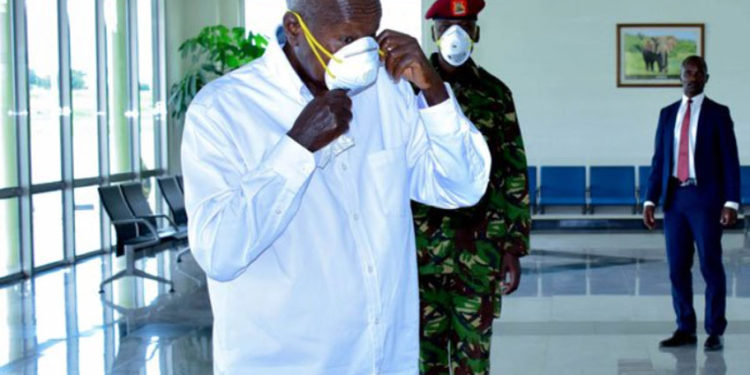Youth Bulge is a concept that identifies youth as a volatile and ever increasing population, contending that societies with high youth populations are vulnerable to violence and social unrest. Countries with weak political institutions are most vulnerable to youth-bulge-related violence.
At no point in recorded history has our world been so demographically uneven, with old people concentrated in rich countries and the young in not -rich countries. Uganda has over 50% of her population as youth.
The relationship between the State and youth is a delicate matter; one that is a potential threat to peace and security. Unemployed and large pools of dissatisfied youths are more susceptible to recruitment into disruptive groups.
Economists have warned that lockdown measures around the world will increase joblessness — that’s already showing up in unemployment numbers in Uganda as a result of the COVID-19 pandemic control measures.
In Uganda, before the COVID-19 Pandemic, over 65% of youth population have been unemployed. As a result of the pandemic, Uganda is faced with collapse in international trade, falling remittances, sharp reversals of capital flows, and currency depreciation. One severe effect of this pandemic is at the end many youth will be laid-off, with abundance of skilled labor with degrees but no jobs “The result is an explosive combination of millions of youth with high expectations and no hope of fulfilling their dreams- this may stimulate social unrest.
With millions of Ugandans in lockdown, a ripple effect throughout the economy is inevitable. Certainly, specific industries bear the brunt of the damage. Shops, restaurants, companies dealing in “non-essential” production with their doors closed, Non-essential travel prohibited; restraining revenue for not just airlines and cruise-ship operators, but smaller businesses that rely on tourism revenue and Manufacturers—outside the medical field—seeing fewer orders as shopping slows down. With high confidence I predict, banks will have to absorb more loan defaults as a portion of its customer base loses work.
Undoubtedly, there is going to be rapid youth rural-urban migration, known to each of us is cities across our country lack the infrastructure and resources to accommodate the large influx of rural youth.
Certainly, these new-urban comers will put great pressure on the government, sow political unrest as they look for work.
NRM should be reminded of the allegory of “our time might well be: Mind your young, or they will trouble you in your old age”.
Whereas NRM proposes that youth should engage in agriculture, it offers nothing on how youth will access land owned by the rich.
If all NRM can think of is letting the youth become self-employed boda boda (taxi) drivers, tomato farmers and sweepers then they are showing an extreme lack of attention to what youth are asking for: a fairer and sound economic system with opportunities.
Youth in other parts of African are already acting as though to prove that youth bulge is a real threat. Groups like LUCHA (Struggle for Change) in Congo and Y’en a Marre (We’ve had enough) in Senegal are using protest, art and everyday mobilizations as participation platforms at local and national levels outside established political institutions, moving away from the representative liberal democratic politics defined based on political institutions. They have embarked on a quest for new public spheres where they can communicate their opinions, ideas, and offer solutions to challenges facing not only them but entire community.
As they do this, they chart their own future: one that sees young people as neither a security risk nor a resource for neoliberal exploitation. It is these movements – for opportunities, political inclusion– that suggest a “demographic time-bomb”.
The problems that our grandparents experienced with our parents aren’t the same that our parents experience with us. Our problems today, are majorly competition for jobs, need for access to internet, human rights, oppressive governments, non-inclusive economic and political systems.
Demographers are quick to stress that youth bulges do not solely explain civil conflicts—corruption, unemployment, poverty, and poor political institutions also play contributing roles—but nor do they rule out as coincidence the predilection toward social unrest among countries with large youth populations.
As there are still many uncertainties about the COVID-19 pandemic: about the extent of its spread, its severity, the length of the outbreak, and whether an initial decline could be followed by a recurrence. Some things are already certain: we know that the economic impact of this pandemic is already immense, dwarfing anything that we have experienced in living memory. The current shock to the global economy is certainly much bigger than that of the 2008 global financial crisis, and is likely to be more severe than the Great Depression. Even the two world wars of the twentieth century, while they disrupted supply chains and devastated physical infrastructure and populations, did not involve the restrictions on mobility and economic activity that are in place in the majority of countries today.
COVID-19 Pandemic is therefore an unprecedented global challenge that requires unprecedented local responses.
Nelson N Nkwene
Chairman, Mitooma Youths Assembly
E-mail: talk2nkwene@gmail.com
Do you have a story in your community or an opinion to share with us: Email us at editorial@watchdoguganda.com












